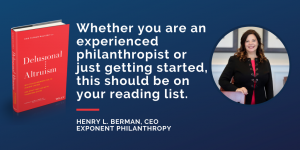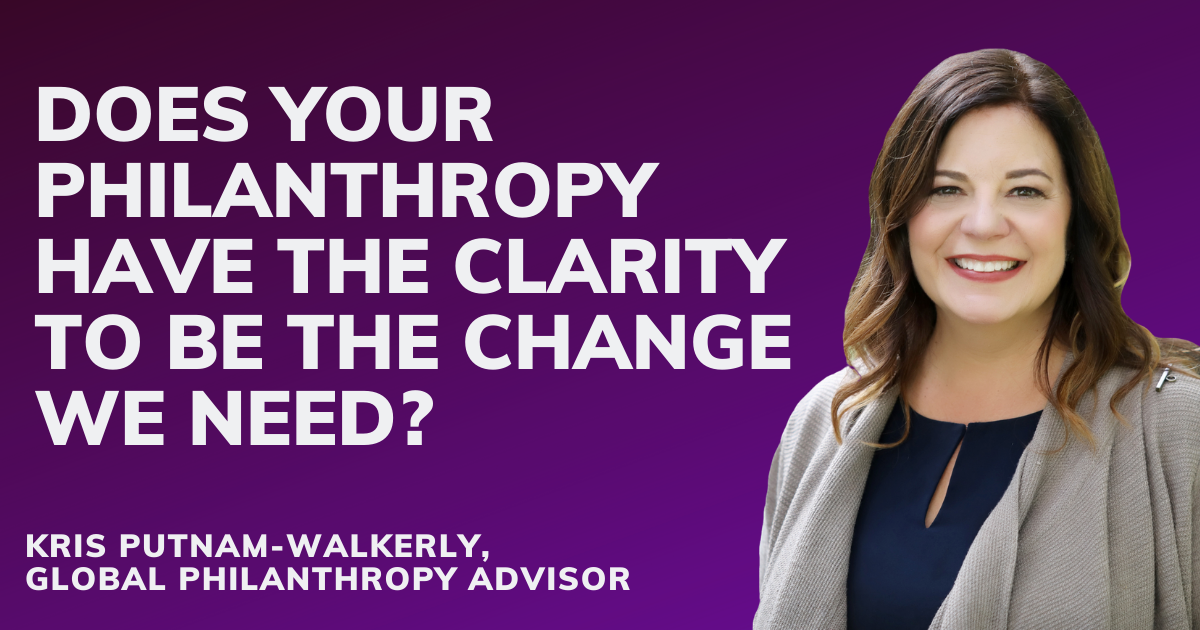During COVID-19, we’ve seen how systemic racism and injustice magnifies personal hardship and undermines recovery. We’re also witnessing what happens when too many nonprofit organizations balance on a financial knife’s edge. So, just when we need robust social safety nets, civil society is at its weakest. Hard on the heels of that massive need, we’re experiencing an even more deafening call to action to condemn business as usual and dismantle racism in this country.
It’s a lot. And it amplifies a question that philanthropists have been grappling with for decades. How do you sensitively and effectively use your power, privilege, and means most effectively—especially in the face of so much need? The answer to that question is complex and multi-faceted. But one thing is for sure: as a funder, you won’t achieve the dramatic changes you seek if you continue clinging to beliefs and practices that are misguided and “delusional.” That’s why I wrote a book about it. It’s called Delusional Altruism: Why Philanthropists Fail To Achieve Change and What They Can Do To Transform Giving.
Now, by “delusional” I don’t mean we’re stupid or crazy! I mean we’re hindering our impact unnecessarily, because of a handful of deceptive and illogical thoughts we choose to hold onto. These illogical thoughts make us get in our own way and often we even don’t realize it. For some, it’s a scarcity mindset. For others it’s fear. Many of us have too many steps that slow us down. Or we ask the wrong questions, which send us down the wrong paths.
The path to truly transformational change can be found by clarifying your purpose and transforming the way you work. If you aren’t doing this already, here are three ways to get started:
1. Think like a mechanic. This means you need to regularly lift up the hood of your philanthropy to notice what’s slowing you down. Look for the friction and leaks. Ask yourself, “What’s wasteful, duplicative, or redundant? What are self-created barriers that keep us and our partners from moving forward?” What’s costing time and money and slowing everyone down?
Maybe you’re attempting to increase fairness and transparency in your work, but you have too many steps, like requiring potential grantees to fill out lengthy application forms, submit three years of audited financial statements, obtain letters of recommendation from community leaders, explain how the project will be evaluated, and host a half-day site visit to showcase the organization. By eliminating self-imposed rules and unnecessary gates and gatekeepers that strain already taxed systems and relationships, everything will run more smoothly.
2. Ask the right questions. Ever feel like any potential pathway could be the right one? You’ve got all these talented people on your team proposing new frameworks and solutions. As you move forward with yet another new initiative, you feel like a squirrel, chasing the next shiny new object. The anecdote to this tail-chasing behavior is to clarify your destination. Sometimes the same question can be the right one in certain circumstances and the wrong one in others. For example, “How should we improve remote education in our school district?” is a really important question. But first, you need to know, “What’s our goal for remote education?” or “Why is remote learning failing some students and not others?”
You can also step back and do this organizationally by asking questions like, “What is the change we want to see in our community in the next 12 months?” Or, “Who do we want to be in a year?” To answer these shorter-term strategic questions effectively, you need to have a clear sightline to your particular philanthropy’s North Star. This means having the answer to questions like, “Why do we exist?” “What do we value?” and “What long-term vision or future state are we trying to achieve?”
3. Build trusting relationships. With little accountability in philanthropy aside from what you create yourself, think about how you can be more accountable to your grantees, those working on the frontlines for change. Start by really listening. Call your grantees and ask them two questions: How are you doing? What can I do to help? Be aware of power dynamics and what grantees may not be saying. You want them to come to you with challenges so you can help in meaningful ways. But they want to maintain your support. There is a lot of power merely being the person with access to wealth. The giver gives, and the recipient receives. Be patient and take the time required to break down barriers and truly get to the heart of things.
To take it a step further, look at your own systems, policies, procedures, and practices that diminish trust and increase power dynamics. By changing how you work, you can elevate voices, improve experiences, and improve outcomes for all stakeholders, including you. This might include ceding power and decision-making to the people most impacted by the issues you fund. Nobody expects you to have all the answers. By operating with a “we’re all in this together” mentality, you get a whole ecosystem of people working collaboratively toward solutions. In addition to alleviating tension and pressure, it’s an approach that yields amazing results.
COVID-19 and the outpouring of response to police violence, ongoing racism, and divisive leadership have all combined to daylight just how tied together we all are, and just how urgently change is needed. Instead of feeling overwhelmed, it’s an opportunity for philanthropists to up your game. By intentionally thinking like a mechanic, asking the right questions, and building trusting relationships, you’ll be doing the important internal work required for collective transformation.
This article was originally written for and published by GlassPockets.
© 2020 Kris Putnam-Walkerly. All rights reserved. Permission granted to excerpt or reprint with attribution.
Order Your Copy of Delusional Altruism!

Here Are Four Ways I Can Help You Right Now
Free Consultation Call: For a limited time, I’m offering a FREE 45-minute Zoom consultation where we can discuss how to keep your team focused on top priorities, adapt to disruption and increase your agility, rapidly refresh your strategy to changing circumstances, increase your speed and get more time back in your day, invest in yourself to achieve the greatest impact, and/or prepare for the recovery phase. There’s no expectation or “pitch” at the end of the call—I simply want to help. I have limited slots, so if you are interested simply click the button below. I will get back to you within 24 hours (or sooner) so that we can schedule a call.
Schedule Your Free Consultation
Sentient Strategy®: If this crisis had taught us anything, it’s the futility of spending one year to create a three-year strategic plan. Sentient Strategy is a revolutionary approach to formulate strategy quickly, to be used immediately for as long as conditions warrant, and then to make changes rapidly as conditions change. It builds a flexible, adaptive strategic approach that creates a roadmap for change and holds people accountable for quick implementation. You’ll achieve faster results, and have a flexible template for adjusting course regularly. Sentient Strategy can be developed in person or remotely within a week. Contact me at kris@putnam-consulting.com if you’d like to learn more!
90-Day Coaching: I’ll help you respond, stay focused, and lead through this crisis with a weekly call and unrestricted email access. This is not a regular offering of mine, it’s intended to help you not just navigate your philanthropy through the storm but to find sunny skies, and to be part of your support system. Together we can discuss any aspect of your work, such as managing your team and board remotely, identifying and implementing top priorities, developing new approaches and partnerships, maintaining focus, not feeling overwhelmed, and preparing for the recovery. I have limited slots, so if you are interested, write me at kris@putnam-consulting.com to learn more and sign up.
VIP Strategy & Coaching Day: For decades, I’ve worked hand-in-hand with global philanthropists, celebrity activists, and wealth advisors who utilize my philanthropic advisor services. Now, you can enjoy a one-on-one private VIP Strategy & Coaching Dayto help improve the impact of your giving. This custom-designed VIP Strategy and Coaching Day can be modified to fit your needs. We can schedule the training over a multi-day period, broken out into 2 to 3 hour sessions so that we don’t interfere with other events on your calendar. My virtual coaching day is run via Zoom, and there are breaks scheduled into the day. Email me at kris@putnam-consulting.com to learn more.
About Kris Putnam-Walkerly
I’m a global philanthropy expert, advisor and award-winning author. I’ve helped hundreds of ultra-high net worth donors, celebrities, foundations, Fortune 500 companies and wealth advisors strategically influence and allocate over half a billion dollars in grants and gifts. I was named one of “America’s Top 20 Philanthropy Speakers” three years in a row, I write about philanthropy for Forbes.com, CEO World, Alliance Magazine, De Dikke Blauwe and am frequently quoted in leading publications such as Bloomberg, NPR and WSJ.







